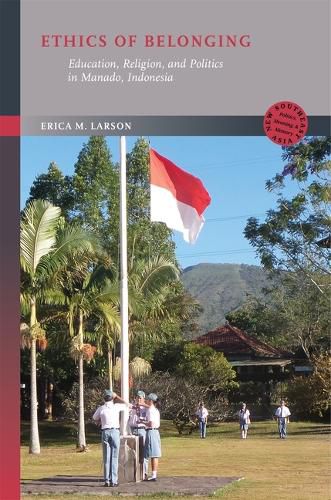Readings Newsletter
Become a Readings Member to make your shopping experience even easier.
Sign in or sign up for free!
You’re not far away from qualifying for FREE standard shipping within Australia
You’ve qualified for FREE standard shipping within Australia
The cart is loading…






The city of Manado and province of North Sulawesi have built a public identity based on religious harmony, claiming to successfully model tolerance and inter-religious relations for the rest of Indonesia. Yet, in discourses and practices relevant to everyday interactions in schools and political debates in the public sphere, two primary contested frames for belonging emerge in tension with one another. On the one hand, "aspirational coexistence" recognizes a common goal of working toward religious harmony and inclusive belonging. On the other hand, "majoritarian coexistence," in which the legitimacy of religious minorities is understood as guaranteed exclusively by the goodwill of the Protestant majority, also emerges in discourses and practices of coexistence. These two agonistic frames of coexistence stem from both a real pride at having staved off ethno-religious violence that plagued surrounding regions at the turn of the twenty-first century, as well as a concern about whether the area will maintain a Christian majority in the future.
Based on ethnographic research in Manado, North Sulawesi, a Protestant-majority region of Indonesia, Ethics of Belonging investigates the dynamics of ethical deliberation about religious coexistence. In this analysis, schools are understood as central sites for exchange about the ethics and politics of belonging in the nation. The author draws on in-depth fieldwork at three secondary schools (a public high school, private Catholic boarding school, and public madrasah), an inter-religious "exchange" program among university students, and societal debates about religion and belonging. Each of the schools promotes a distinct method to addressing diversity and a particular understanding of the relationship between religious and civic values. Larson's research demonstrates how ethical frameworks for approaching religious difference are channeled and negotiated through educational institutions, linking up with their broader political context and debates in the community. This resource argues for a consideration of ethical reflection as a fundamentally pedagogical process, with important ramifications beyond the immediate environment. The focus on educational institutions provides a critical connection between interpersonal and public ethical deliberation, elucidating the entanglements of ethics and politics and their manifestation across different societal scales.
$9.00 standard shipping within Australia
FREE standard shipping within Australia for orders over $100.00
Express & International shipping calculated at checkout
The city of Manado and province of North Sulawesi have built a public identity based on religious harmony, claiming to successfully model tolerance and inter-religious relations for the rest of Indonesia. Yet, in discourses and practices relevant to everyday interactions in schools and political debates in the public sphere, two primary contested frames for belonging emerge in tension with one another. On the one hand, "aspirational coexistence" recognizes a common goal of working toward religious harmony and inclusive belonging. On the other hand, "majoritarian coexistence," in which the legitimacy of religious minorities is understood as guaranteed exclusively by the goodwill of the Protestant majority, also emerges in discourses and practices of coexistence. These two agonistic frames of coexistence stem from both a real pride at having staved off ethno-religious violence that plagued surrounding regions at the turn of the twenty-first century, as well as a concern about whether the area will maintain a Christian majority in the future.
Based on ethnographic research in Manado, North Sulawesi, a Protestant-majority region of Indonesia, Ethics of Belonging investigates the dynamics of ethical deliberation about religious coexistence. In this analysis, schools are understood as central sites for exchange about the ethics and politics of belonging in the nation. The author draws on in-depth fieldwork at three secondary schools (a public high school, private Catholic boarding school, and public madrasah), an inter-religious "exchange" program among university students, and societal debates about religion and belonging. Each of the schools promotes a distinct method to addressing diversity and a particular understanding of the relationship between religious and civic values. Larson's research demonstrates how ethical frameworks for approaching religious difference are channeled and negotiated through educational institutions, linking up with their broader political context and debates in the community. This resource argues for a consideration of ethical reflection as a fundamentally pedagogical process, with important ramifications beyond the immediate environment. The focus on educational institutions provides a critical connection between interpersonal and public ethical deliberation, elucidating the entanglements of ethics and politics and their manifestation across different societal scales.